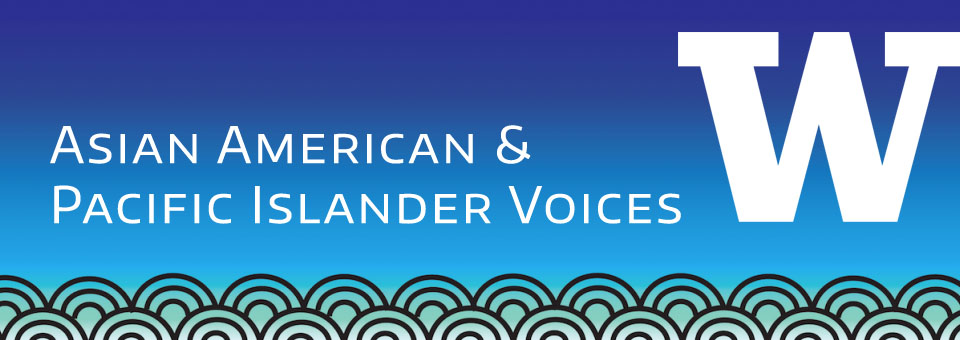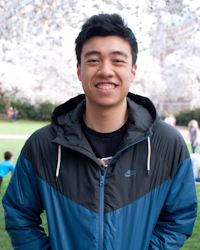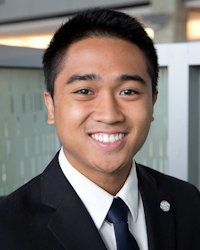
Celebrating Our Culture
To commemorate Asian American and Pacific Islander (AAPI) Heritage Month in May, UW students, staff, faculty and alumni share their personal stories of identity in a project titled, “No Longer Invisible: In Their Own Words.” These stories highlight the diversity in language, religion, culture and tradition of the AAPI communities and are collected from interested volunteers. Featured below are personal immigration stories of the families of our active and alumni brothers.
Benny Tran, Chinese American
 Like many others, my family migrated to the US in hope of finding opportunity and a better life. They migrated in different waves and worked to establish themselves so that the next group of family members would have something to come to and look forward to.
Like many others, my family migrated to the US in hope of finding opportunity and a better life. They migrated in different waves and worked to establish themselves so that the next group of family members would have something to come to and look forward to.
Growing up with immigrant parents, my worst fear is thinking that my family’s cultural traditions and values would end with me. My Chinese speaking skills aren’t the best, and the language barrier is worst when communicating with my grandparents. I always wondered if they were disappointed that I didn’t grow up in the same setting with the same cultural values as them. This ultimately compelled me to learn more about my heritage and listen to my parents’ stories. I felt so proud of my family’s history and dedication to provide me with a good life that I can remember laying in bed for hours re-telling their stories to myself in my head. One day, I realized that this fear of stories and traditions ending with me had suddenly disappeared.
I hope that one day AAPI communities are no longer grouped into single categories, where every individual story / history can be shared without being associated with overarching stereotypes or generalizations. One day when AAPI communities can consist of everyone in the world who is willing to listen and respect each of the unique cultures.
Kevin Kim, Korean American
 Prior to attending college, my parents wanted me to join a Korean school. Their main goal was so that I could confirm that I realize my Korean heritage. I was full born American! Why would I need to know Korean to survive in a country that speaks English?
Prior to attending college, my parents wanted me to join a Korean school. Their main goal was so that I could confirm that I realize my Korean heritage. I was full born American! Why would I need to know Korean to survive in a country that speaks English?
As I stepped into the classroom, I glanced around and noticed my fellow classmates with a similar expression: unwillingness. As soon as I sat down, the teacher ordered the class to write an anecdote and handed out blank sheets of paper, which was followed by groans across the classroom. Even so, I managed to muster up a story and attempted to display my own ideals on paper.
At the end of class, the teacher ominously told me that she wanted to see my parents. Nervously, I called my mother in and the teacher revealed the news. Out of all the students, my story was chosen by the faculty to represent the school in a campus-wide oratory contest. Filled with anxiety and apprehension, I stuttered until my mother immediately replied, “of course!”
Those days of preparation were hell. Everyday it was reviewing the same syllables, characters, and symbols. Concluding that there simply was no joy in being Korean, I wanted to leave and forget my Korean heritage. Why do I have to go through all this trouble just for my culture? In spite being forced to accept my heritage, I constantly blamed my parents for having me undergo all the stress I was experiencing. However, their response was always the same. “You will always be able to remember your identity.” After multiple heated arguments, I had acquired a deeper understanding about my culture but continued to reject it from my life.
Before I knew it, the dreadful day of the competition had arrived. As I walked to the podium, I noticed all the other contestants nervously repeating their own speeches to make sure they would not make a mistake. I never had the confidence to speak in front of an audience, yet alone express my passion about my heritage. It all seemed ludicrous until the president of our Korean school displayed the pride of his citizenship with these words: “My mother represents Korea as I was brought to life thanks to her, while America represents my father as he allowed me to develop into a human being.”
After his speech, my shame of being Korean American quickly disintegrated. Whether I failed or succeeded in achieving a prize, I realized that I have obtained an even greater accolade. All my life, I believed I was an American for I was born and raised here my entire life. I was wrong. I am a Korean American and after tedious searching, I finally discovered my identity. Ever since this moment, I have embraced my heritage and the many customs that I can pass down to another generation. After all, two things are better than one.
Bryan Dosono, Filipino American
 Both of my parents immigrated from the Philippines to settle down on the Yakama Reservation in Washington State. Born there in the 1990s, I came to appreciate the value of diversity at a very early age. “So what are you, really?” remained a frequently asked question from my peers and teachers. I identify as Filipino American, and though Filipino Americans comprise the second largest Asian American ethnic group in the United States, they fall subject to the scrutiny of racial ambiguity. Hispanic surnames and dark complexions contribute to the misrecognition of Filipinos as Latino, Black, and even Native American. Facing difficulty in explaining my heritage to others as I knew so little about it, I sometimes found it easier to blend in with the identities of other students of color than to stand out as a Filipino American.
Both of my parents immigrated from the Philippines to settle down on the Yakama Reservation in Washington State. Born there in the 1990s, I came to appreciate the value of diversity at a very early age. “So what are you, really?” remained a frequently asked question from my peers and teachers. I identify as Filipino American, and though Filipino Americans comprise the second largest Asian American ethnic group in the United States, they fall subject to the scrutiny of racial ambiguity. Hispanic surnames and dark complexions contribute to the misrecognition of Filipinos as Latino, Black, and even Native American. Facing difficulty in explaining my heritage to others as I knew so little about it, I sometimes found it easier to blend in with the identities of other students of color than to stand out as a Filipino American.
Growing up on a Native reservation, I did not identify with other students with similar cultural backgrounds because AAPIs accounted for less than 1% of the county’s demographic. I experienced a complete culture reversal when I moved to Seattle to study at the University of Washington. At last, no longer did I represent one of the few AAPI students in my school; I enrolled as one of thousands, and I relished this new environment so much that I jumped at every social opportunity to get to know more AAPI students. I initially joined a wide array of Asian interest organizations, such as the Vietnamese/Taiwanese/Khmer Student Associations, but it felt awkward to start conversations with students from these groups because I knew nothing about their culture, let alone my own, to reciprocate meaningful cultural dialogue. I eventually found my niche on campus in Lambda Phi Epsilon, an Asian American interest fraternity, because its membership aimed to unite Asian American leaders under one common brotherhood. Through this fraternity, I made lifelong friends that introduced me to many aspects of AAPI culture (e.g., K-pop music, Polynesian dancing, sushi cuisine) and educated me on critical issues relevant to Asian American and Pacific Islander history that I never learned back in the classroom on the Yakama Reservation.
Once clueless and uninformed, I now maintain a firm grasp on how to combat social inequities, appreciate cultural traditions, and activate silent AAPI voices around me. I never imagined coalition building and grassroots organizing to develop into passionate side hobbies, but these skills enabled me to make systemic changes within my community. Today I no longer feel invisible, and I envision the AAPI narrative of struggle, devotion, and triumph to emerge as one of the most pronounced stories on the shelf of American history.
Andrew Yeh, Taiwanese American
 Throughout my time in college, I have had the opportunity to make lasting memories and build lifelong friendships. These experiences have made me a better person and I attribute that entirely to Lambda Phi Epsilon, an Asian-American fraternity that I joined in my freshman year. When I first came to UW from California, I was still unsure about how I wanted to spend my college years. I was essentially leaving all of my friends behind and starting a new life in a new city and state. Joining Lambda Phi Epsilon allowed me to not only build a community with students that I identified with, but also find a group of driven individuals whom I shared similar passions. By networking through Lambda Phi Epsilon, I was able to intern with the Associated Students of the University of Washington as the Assistant Director of the Asian Student Commission, the umbrella organization of all Asian interest organizations on campus.
Throughout my time in college, I have had the opportunity to make lasting memories and build lifelong friendships. These experiences have made me a better person and I attribute that entirely to Lambda Phi Epsilon, an Asian-American fraternity that I joined in my freshman year. When I first came to UW from California, I was still unsure about how I wanted to spend my college years. I was essentially leaving all of my friends behind and starting a new life in a new city and state. Joining Lambda Phi Epsilon allowed me to not only build a community with students that I identified with, but also find a group of driven individuals whom I shared similar passions. By networking through Lambda Phi Epsilon, I was able to intern with the Associated Students of the University of Washington as the Assistant Director of the Asian Student Commission, the umbrella organization of all Asian interest organizations on campus.
Because my parents immigrated from Taiwan over 20 years ago, I would consider them more Americanized than most traditional Taiwanese parents. However, there still remain cultural values that my family finds important. When I was younger, I was taught to always treat my elders with respect and greet them with a bow. Because wisdom was regarded as the most important thing a person could obtain, an individual’s age usually correlated with the level of respect. Language and identity were very important to my parents. When speaking to them, they would refuse to respond unless I spoke to them in Mandarin or Taiwanese. They wanted to make sure that even though I grew up in an American culture, I would still remember my Taiwanese heritage.
It is important for the AAPI community to be visible because of how rapidly our community is growing. A few decades ago, the voices of the AAPI community were easily drowned out and it was difficult to be heard by the public. However, today’s society is completely different. Organizations such as Lambda Phi Epsilon and the Asian Student Commission have united the AAPI community both internationally and locally and allowed us to collectively promote our opinions and create change. Thus, one of the major issues that I think the AAPI community needs to be aware about is political activism. Even though our community has strong opinions about many issues, a large number of people choose not to vote or are not aware about how to register. This creates a problem because voting is the ultimate deciding factor. My vision for the AAPI community is for us to be more involved in politics. Whether it’s simply just voting or even running for public office, I believe that the AAPI community has the potential to become a powerful force in America.
